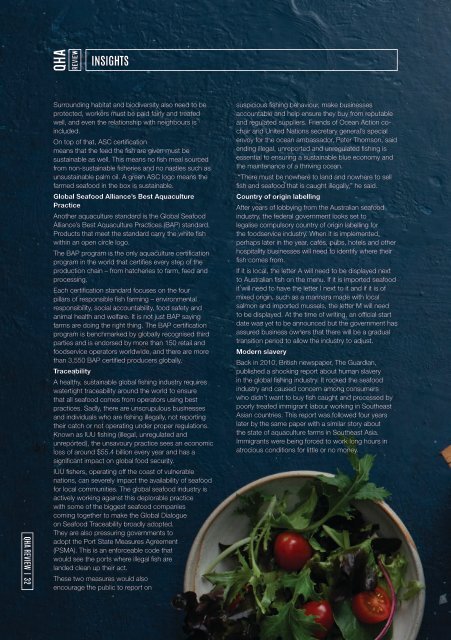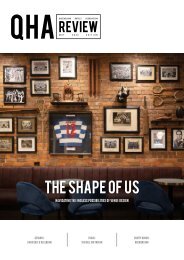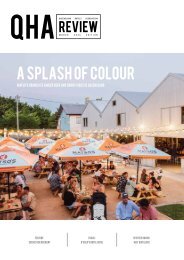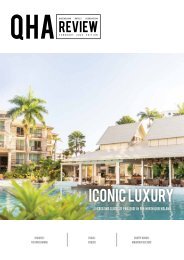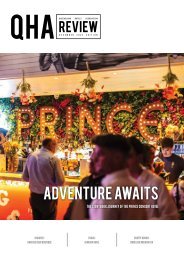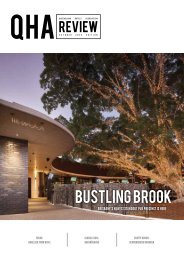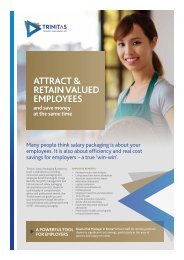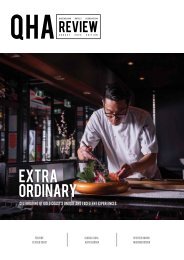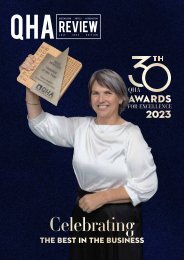QHA-Review_April_Digital
- No tags were found...
You also want an ePaper? Increase the reach of your titles
YUMPU automatically turns print PDFs into web optimized ePapers that Google loves.
INSIGHTS<br />
<strong>QHA</strong> REVIEW | 32<br />
Surrounding habitat and biodiversity also need to be<br />
protected, workers must be paid fairly and treated<br />
well, and even the relationship with neighbours is<br />
included.<br />
On top of that, ASC certification<br />
means that the feed the fish are given must be<br />
sustainable as well. This means no fish meal sourced<br />
from non-sustainable fisheries and no nasties such as<br />
unsustainable palm oil. A green ASC logo means the<br />
farmed seafood in the box is sustainable.<br />
Global Seafood Alliance’s Best Aquaculture<br />
Practice<br />
Another aquaculture standard is the Global Seafood<br />
Alliance’s Best Aquaculture Practices (BAP) standard.<br />
Products that meet the standard carry the white fish<br />
within an open circle logo.<br />
The BAP program is the only aquaculture certification<br />
program in the world that certifies every step of the<br />
production chain – from hatcheries to farm, feed and<br />
processing.<br />
Each certification standard focuses on the four<br />
pillars of responsible fish farming – environmental<br />
responsibility, social accountability, food safety and<br />
animal health and welfare. It is not just BAP saying<br />
farms are doing the right thing. The BAP certification<br />
program is benchmarked by globally recognised third<br />
parties and is endorsed by more than 150 retail and<br />
foodservice operators worldwide, and there are more<br />
than 3,550 BAP certified producers globally.<br />
Traceability<br />
A healthy, sustainable global fishing industry requires<br />
watertight traceability around the world to ensure<br />
that all seafood comes from operators using best<br />
practices. Sadly, there are unscrupulous businesses<br />
and individuals who are fishing illegally, not reporting<br />
their catch or not operating under proper regulations.<br />
Known as IUU fishing (illegal, unregulated and<br />
unreported), the unsavoury practice sees an economic<br />
loss of around $55.4 billion every year and has a<br />
significant impact on global food security.<br />
IUU fishers, operating off the coast of vulnerable<br />
nations, can severely impact the availability of seafood<br />
for local communities. The global seafood industry is<br />
actively working against this deplorable practice<br />
with some of the biggest seafood companies<br />
coming together to make the Global Dialogue<br />
on Seafood Traceability broadly adopted.<br />
They are also pressuring governments to<br />
adopt the Port State Measures Agreement<br />
(PSMA). This is an enforceable code that<br />
would see the ports where illegal fish are<br />
landed clean up their act.<br />
These two measures would also<br />
encourage the public to report on<br />
suspicious fishing behaviour, make businesses<br />
accountable and help ensure they buy from reputable<br />
and regulated suppliers. Friends of Ocean Action cochair<br />
and United Nations secretary general’s special<br />
envoy for the ocean ambassador, Peter Thomson, said<br />
ending illegal, unreported and unregulated fishing is<br />
essential to ensuring a sustainable blue economy and<br />
the maintenance of a thriving ocean.<br />
“There must be nowhere to land and nowhere to sell<br />
fish and seafood that is caught illegally,” he said.<br />
Country of origin labelling<br />
After years of lobbying from the Australian seafood<br />
industry, the federal government looks set to<br />
legalise compulsory country of origin labelling for<br />
the foodservice industry. When it is implemented,<br />
perhaps later in the year, cafés, pubs, hotels and other<br />
hospitality businesses will need to identify where their<br />
fish comes from.<br />
If it is local, the letter A will need to be displayed next<br />
to Australian fish on the menu. If it is imported seafood<br />
it will need to have the letter I next to it and if it is of<br />
mixed origin, such as a marinara made with local<br />
salmon and imported mussels, the letter M will need<br />
to be displayed. At the time of writing, an official start<br />
date was yet to be announced but the government has<br />
assured business owners that there will be a gradual<br />
transition period to allow the industry to adjust.<br />
Modern slavery<br />
Back in 2010, British newspaper, The Guardian,<br />
published a shocking report about human slavery<br />
in the global fishing industry. It rocked the seafood<br />
industry and caused concern among consumers<br />
who didn’t want to buy fish caught and processed by<br />
poorly treated immigrant labour working in Southeast<br />
Asian countries. This report was followed four years<br />
later by the same paper with a similar story about<br />
the state of aquaculture farms in Southeast Asia.<br />
Immigrants were being forced to work long hours in<br />
atrocious conditions for little or no money.


